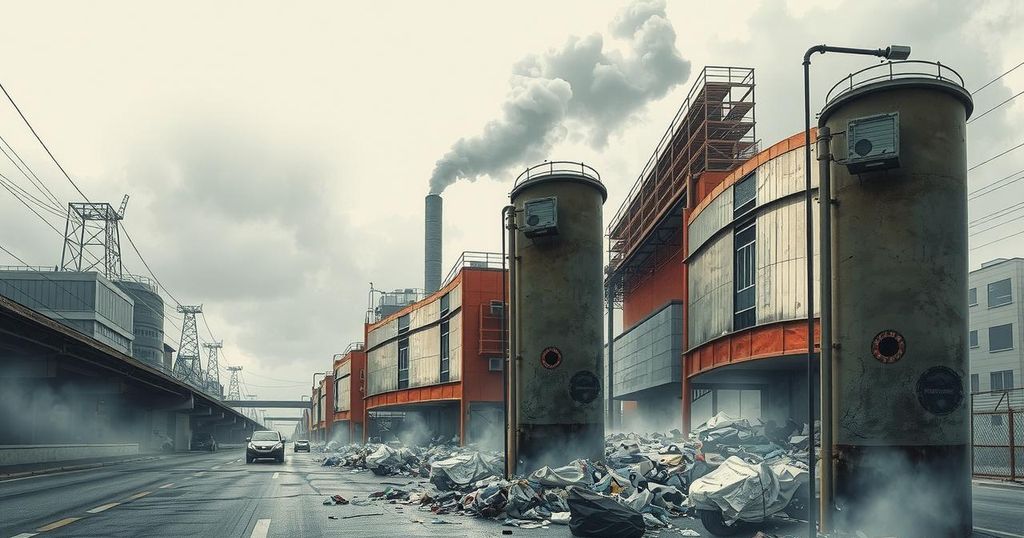Ghana, Nigeria, Chad, and Rwanda Among Most Polluted Countries in 2024 Report

The 2024 World Air Quality Report reveals concerning pollution levels in Africa, with Chad, Nigeria, Ghana, and Rwanda ranking as some of the most polluted countries. PM2.5 concentration levels significantly exceed WHO guidelines, posing severe health risks. Ghana is experiencing a sharp rise in air pollution, identified as a public health crisis, necessitating immediate governmental action to address environmental regulations and air quality monitoring.
The 2024 World Air Quality Report has presented troubling pollution levels in Africa, highlighting Ghana, Nigeria, Chad, and Rwanda as some of the most polluted countries globally. The report underscores the escalating air quality crisis, threatening the health of millions. Chad, at the top, has a PM2.5 concentration of 91.8 µg/m³, significantly exceeding the World Health Organization’s (WHO) recommended limit of 5 µg/m³.
Ghana ranks as the 14th most polluted country with a PM2.5 level of 35.8 µg/m³. For context, PM2.5 refers to fine particulate matter that penetrates deep into the lungs, posing high risks for respiratory and cardiovascular diseases. The particles are less than 2.5 microns in diameter, rendering them nearly invisible yet extremely harmful.
The University of Chicago’s data indicates that air pollution has reduced lifespans in heavily affected areas by an average of 2.7 years. In Ghana, around 28,000 deaths annually are attributed to air pollution. The global toll is staggering, with air pollution responsible for 8.1 million deaths annually, equating to nearly 22,192 daily. Without intervention, this health crisis may persist, escalating annual fatalities.
Ghana’s air pollution has increased significantly, now exceeding the WHO safe limit by seven times. Accra is identified as the 16th most polluted capital globally, yet Kumasi has surpassed it as Ghana’s most polluted city with a PM2.5 level of 39.5 µg/m³. Ghana’s rankings have worsened consistently: from 27th in 2022 to 14th in 2024, showcasing a dramatic rise in pollution levels.
The ongoing air quality crisis across Africa suggests severe pollution and inadequate monitoring. Notably, five of the ten most polluted countries are in Africa, and only 24 out of 54 countries provided air quality data due to monitoring challenges. Moreover, many African cities recorded PM2.5 levels several times above WHO standards, leaving significant concerns about health implications and urban management.
Air pollution is recognized as a public health emergency in Ghana, with WHO estimating 28,000 deaths due to toxic air, translating to one death every 19 minutes. This trend leads to at least 2,333 deaths monthly unless addressed. The economic burden is also alarming, with air pollution projected to cost Ghana’s urban areas around $137.8 billion by 2040 if unmitigated.
In comparison, only 17% of cities worldwide meet WHO air quality guidelines. Chad leads as the most polluted country, while specific cities like Nieuwoudtville in South Africa have met standards. The findings highlight stark disparities in air quality across global contexts, emphasizing the urgent need for action.
The IQAir report cites rapid urbanization, population growth, industrial emissions, and waste burning as major pollutants in Africa. For instance, Kinshasa’s PM2.5 levels surged by 40%, revealing intensified industrial activity. Moreover, 67% of air quality data in Africa now comes from NGOs, reflecting a critical gap in governmental monitoring efforts.
As Ghana grapples with worsening air quality, experts urge the government to implement stricter environmental policies, including enhanced vehicle emission regulations, increased investment in renewable energy, and expanded air quality monitoring systems. The urgency of these measures is paramount to avert a further public health crisis in the years to come.
The 2024 World Air Quality Report has highlighted the alarming air quality crisis in Africa, with Ghana, Nigeria, Chad, and Rwanda among the most polluted nations. The increasing PM2.5 levels, particularly in Ghana, emphasize the urgent need for comprehensive air quality monitoring and stricter environmental regulations to combat air pollution. Without immediate action, the health and economic repercussions may become dire, necessitating a focused response from governments and stakeholders alike to safeguard public health.
Original Source: www.myjoyonline.com







